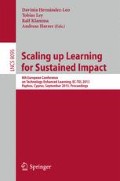Abstract
This paper reports on our ongoing research around learning analytics. We focus on how learning analytics can be used to increase student motivation and the use of badges as a way to aggregate learning activity being a representation of their goals and progress along the course. The context of this work is an open learning environment, based on wikis, blogs, twitter, an activity stream mash-up and an open badges system. Our evaluation analyses perceived usefulness and usability of the system, as well as the impact on student motivation. Our results indicate that badges are useful to motivate students while activity streams have the potential to activate students.
Access this chapter
Tax calculation will be finalised at checkout
Purchases are for personal use only
Preview
Unable to display preview. Download preview PDF.
References
Eales, R.T.J., Hall, T., Bannon, L.J.: The motivation is the message: comparing cscl in different settings. In: Proc. of CSCL 2002, International Society of the Learning Sciences, pp. 310–317 (2002)
Santos, J.L., Verbert, K., Govaerts, S., Duval, E.: Addressing learner issues with stepup!: An evaluation. In: Proc. of LAK 2013. ACM (accepted, 2013)
Volet, S., Vauras, M.: Interpersonal Regulation of Learning and Motivation: Methodological Advances. Routledge (2013)
Williams, K.C., Williams, C.C.: Five key ingredients for improving student motivation. Research in Higher Education Journal 12, 1–23 (2011)
Savage, N., Birch, R., Noussi, E.: Motivation of engineering students in higher education. Engineering Education 6(2), 39–46 (2012)
Di Serio, Á., Ibáñez, M.B., Kloos, C.D.: Impact of an augmented reality system on studentsmotivation for a visual art course. Computers & Education (2012)
Hsiao, I.-H., Brusilovsky, P.: Motivational social visualizations for personalized E-learning. In: Ravenscroft, A., Lindstaedt, S., Kloos, C.D., Hernández-Leo, D. (eds.) EC-TEL 2012. LNCS, vol. 7563, pp. 153–165. Springer, Heidelberg (2012)
Parra, G., Klerkx, J., Duval, E.: What should i read next? awareness of relevant publications through a community of practice. In: Proc. of CHI EA 2013. ACM (accepted, 2013)
Wenger, E.: Communities of practice: Learning, meaning, and identity. Cambridge University Press (1999)
Govaerts, S., Verbert, K., Duval, E., Pardo, A.: The student activity meter for awareness and self-reflection. In: Proc. of CHI EA 2012, pp. 869–884. ACM (2012)
Young, J.R.: Badges earned online pose challenge to traditional college diplomas. Chronicle of Higher Education (2012)
Goligoski, E.: Motivating the learner: Mozillas open badges program. Access to Knowledge: A Course Journal 4(1) (2012)
Domínguez, A., Saenz-de Navarrete, J., de Marcos, L., Fernández-Sanz, L., Pagés, C., Martínez-Herráiz, J.J.: Gamifying learning experiences: Practical implications and outcomes. Computers & Education 63, 380–392 (2013)
Michel, C., Lavoué, E., Pietrac, L.: A dashboard to regulate project-based learning. In: Ravenscroft, A., Lindstaedt, S., Kloos, C.D., Hernández-Leo, D. (eds.) EC-TEL 2012. LNCS, vol. 7563, pp. 250–263. Springer, Heidelberg (2012)
Olson, J.F., Howison, J., Carley, K.M.: Paying attention to each other in visible work communities: Modeling bursty systems of multiple activity streams. In: IEEE SocialCom, pp. 276–281 (2010)
Li, I., Dey, A., Forlizzi, J., Höök, K., Medynskiy, Y.: Personal informatics and hci: design, theory, and social implications. In: Proc. of CHI EA 2011, pp. 2417–2420. ACM (2011)
Li, I., Dey, A., Forlizzi, J.: A stage-based model of personal informatics systems. In: Proc. of CHI 2010, pp. 557–566. ACM (2010)
Verbert, K., Duval, E., Klerkx, J., Govaerts, S., Santos, J.L.: Learning analytics dashboard applications. American Behavioral Scientist (accepted, 2013)
Podgorelec, V., Kuhar, S.: Taking advantage of education data: Advanced data analysis and reporting in virtual learning environments. Electronics and Electrical Engineering 114(8), 111–116 (2011)
Leony, D., Pardo, A., de la Fuente Valentín, L., de Castro, D.S., Kloos, C.D.: Glass: A learning analytics visualization tool. In: Proc. of LAK 2012, pp. 162–163. ACM (2012)
Gutiérrez Rojas, I., Crespo García, R.M., Delgado Kloos, C.: Enhancing orchestration of lab sessions by means of awareness mechanisms. In: Ravenscroft, A., Lindstaedt, S., Kloos, C.D., Hernández-Leo, D. (eds.) EC-TEL 2012. LNCS, vol. 7563, pp. 113–125. Springer, Heidelberg (2012)
Hamari, J., Koivisto, J.: Social motivations to use gamification: an empirical study of gamifying exercise. In: Proc. of ECIS 2013 (2013)
Grosseck, G., Holotescu, C.: Can we use twitter for educational activities. In: eLSE08 (2008), http://adlunap.ro/else
Zeng, X., Mehdi, Q.H., Gough, N.E.: Shape of the story: Story visualization techniques. In: Proc. of IV 2003, pp. 144–149. IEEE (2003)
Dawson, S., Bakharia, A., Heathcote, E.: Snapp: Realising the affordances of real-time sna within networked learning environments. In: Proc. of NLC 2010, pp. 125–133 (2010)
Kosba, E., Dimitrova, V., Boyle, R.: Using student and group models to support teachers in web-based distance education. In: Ardissono, L., Brna, P., Mitrović, A. (eds.) UM 2005. LNCS (LNAI), vol. 3538, pp. 124–133. Springer, Heidelberg (2005)
Naaman, M., Boase, J., Lai, C.H.: Is it really about me?: message content in social awareness streams. In: Proc. of CSCW 2010, pp. 189–192. ACM (2010)
Brooke, J.: Sus-a quick and dirty usability scale. Usability Evaluation in Industry, 189–194 (1996)
Author information
Authors and Affiliations
Editor information
Editors and Affiliations
Rights and permissions
Copyright information
© 2013 Springer-Verlag Berlin Heidelberg
About this paper
Cite this paper
Santos, J.L., Charleer, S., Parra, G., Klerkx, J., Duval, E., Verbert, K. (2013). Evaluating the Use of Open Badges in an Open Learning Environment. In: Hernández-Leo, D., Ley, T., Klamma, R., Harrer, A. (eds) Scaling up Learning for Sustained Impact. EC-TEL 2013. Lecture Notes in Computer Science, vol 8095. Springer, Berlin, Heidelberg. https://doi.org/10.1007/978-3-642-40814-4_25
Download citation
DOI: https://doi.org/10.1007/978-3-642-40814-4_25
Publisher Name: Springer, Berlin, Heidelberg
Print ISBN: 978-3-642-40813-7
Online ISBN: 978-3-642-40814-4
eBook Packages: Computer ScienceComputer Science (R0)

